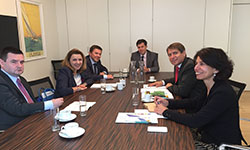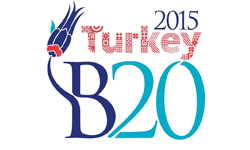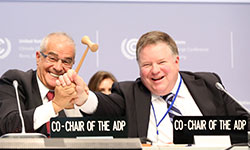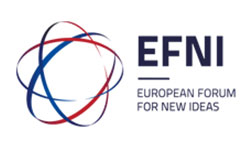BusinessEurope Headlines No. 2015-27
Strengthening EU-Ukrainian trade and investment ties
 Ahead of the entering into force of the EU-Ukraine Deep and Comprehensive Trade Agreement (DCFTA) scheduled for 1 January 2016, BusinessEurope met the Ukrainian Deputy Minister for Economic Development, Ms Nataliya Mykolska, to discuss how best to promote Ukraine as a business destination among EU companies. The reform process in Ukraine was among the topics on the agenda as the country is preparing to move closer to EU standards in a number of areas that are key to attract investment. The meeting also served as an occasion to exchange views on future initiatives aimed at promoting trade and investment opportunities for EU companies in Ukraine. BusinessEurope is working closely with Ukrainian business to maximise the positive impacts of trade liberalisation that will result from the DCFTA.
Ahead of the entering into force of the EU-Ukraine Deep and Comprehensive Trade Agreement (DCFTA) scheduled for 1 January 2016, BusinessEurope met the Ukrainian Deputy Minister for Economic Development, Ms Nataliya Mykolska, to discuss how best to promote Ukraine as a business destination among EU companies. The reform process in Ukraine was among the topics on the agenda as the country is preparing to move closer to EU standards in a number of areas that are key to attract investment. The meeting also served as an occasion to exchange views on future initiatives aimed at promoting trade and investment opportunities for EU companies in Ukraine. BusinessEurope is working closely with Ukrainian business to maximise the positive impacts of trade liberalisation that will result from the DCFTA.
Contact: Luisa Santos
Business priorities for the Turkish G20 presidency
 The business community of G20 economies gathered in Ankara on 3-5 September to discuss the priorities to be presented to political leaders during the Turkish presidency. The conclusions are the result of the work done by dedicated task forces that over this year addressed issues related to trade, infrastructure and investment, financing growth, SMEs and entrepreneurship, employment and fight against corruption. BusinessEurope was part of the Trade Task Force that, as its main conclusion, emphasises the need to implement the WTO Trade Facilitation Agreement, push for an effective rollback of protectionism and protectionist measures, promote a better integration of SMEs in global supply chains and in international trade and simplify customs by making use of digital tools. The event was also an opportunity to introduce next year’s China G20 presidency.
The business community of G20 economies gathered in Ankara on 3-5 September to discuss the priorities to be presented to political leaders during the Turkish presidency. The conclusions are the result of the work done by dedicated task forces that over this year addressed issues related to trade, infrastructure and investment, financing growth, SMEs and entrepreneurship, employment and fight against corruption. BusinessEurope was part of the Trade Task Force that, as its main conclusion, emphasises the need to implement the WTO Trade Facilitation Agreement, push for an effective rollback of protectionism and protectionist measures, promote a better integration of SMEs in global supply chains and in international trade and simplify customs by making use of digital tools. The event was also an opportunity to introduce next year’s China G20 presidency.
Read more or contact: Luisa Santos
Climate: UN talks in Bonn
 BusinessEurope as an observer participated in the tenth meeting of the Ad-hoc Group of the Durban Platform (ADP 2.10) held in Bonn, Germany from 31 August to 4 September. The goal of this session was to prepare a negotiation text enabling ministers to reach a new agreement to tackle climate change at the end of the year. Although some progress was achieved with structured discussions around the issues vital to enable ministers to reach an agreement in Paris, there are now only five negotiating days left before COP21 starts. Therefore, BusinessEurope reiterates the urgency to accelerate the pace of negotiations and start clearly sketching the main elements of the future Paris agreement. In June BusinessEurope presented 10 recommendations for a successful international agreement.
BusinessEurope as an observer participated in the tenth meeting of the Ad-hoc Group of the Durban Platform (ADP 2.10) held in Bonn, Germany from 31 August to 4 September. The goal of this session was to prepare a negotiation text enabling ministers to reach a new agreement to tackle climate change at the end of the year. Although some progress was achieved with structured discussions around the issues vital to enable ministers to reach an agreement in Paris, there are now only five negotiating days left before COP21 starts. Therefore, BusinessEurope reiterates the urgency to accelerate the pace of negotiations and start clearly sketching the main elements of the future Paris agreement. In June BusinessEurope presented 10 recommendations for a successful international agreement.
Read more or contact: Margarida Bolzer
Photo ©: IISD/Earth Negotiations Bulletin
Deepening the single market in goods and services
 The single market can be a powerful lever to increase Europe’s productivity. But this will only happen if the remaining barriers are removed and its fragmentation is properly addressed. On the occasion of a workshop organised by the UK Permanent Representation, Deputy Director Guido Lobrano highlighted that this does not necessarily require new rules, but better application of existing ones at national level. It is also key that developments like servitisation – closer links between goods and services – and the sharing economy are properly taken into account in EU legislation. In terms of enforcement, those practices resulting in different price or limited access to goods or services across the single market need to be addressed on a case-by-case basis, assessing whether they are justified or not.
The single market can be a powerful lever to increase Europe’s productivity. But this will only happen if the remaining barriers are removed and its fragmentation is properly addressed. On the occasion of a workshop organised by the UK Permanent Representation, Deputy Director Guido Lobrano highlighted that this does not necessarily require new rules, but better application of existing ones at national level. It is also key that developments like servitisation – closer links between goods and services – and the sharing economy are properly taken into account in EU legislation. In terms of enforcement, those practices resulting in different price or limited access to goods or services across the single market need to be addressed on a case-by-case basis, assessing whether they are justified or not.
Contact: Guido Lobrano
Addressing B2C contract law barriers in the internal market
 Any future EU initiative regarding consumer rules in the EU should be evidence-based, provide a realistic level of protection and follow a fully targeted harmonisation approach. The transposition of minimum harmonisation directives created a patchwork of rules in sale of tangible goods. Small businesses with limited resources are particularly affected by these differences, namely regarding guaranties and remedies. When it comes to rules on sale of digital content, an EU approach would have the benefit of avoiding a new wave of legal fragmentation. These messages were conveyed by BusinessEurope in its response to the European Commission consultation on online sale of digital and tangible goods.
Any future EU initiative regarding consumer rules in the EU should be evidence-based, provide a realistic level of protection and follow a fully targeted harmonisation approach. The transposition of minimum harmonisation directives created a patchwork of rules in sale of tangible goods. Small businesses with limited resources are particularly affected by these differences, namely regarding guaranties and remedies. When it comes to rules on sale of digital content, an EU approach would have the benefit of avoiding a new wave of legal fragmentation. These messages were conveyed by BusinessEurope in its response to the European Commission consultation on online sale of digital and tangible goods.
Read more or contact: Pedro Oliveira
Better implementation will stimulate circular economy
 Debates around the new circular economy package are scaling up. What kind of framework could incentivise acceleration of the circular economy the best across the European society? What are the ‘show stoppers’ or what role for the European semester? These are a few of questions Alexandre Affre, BusinessEurope Director for Industrial Affairs, raised at the event “economic governance, business and the circular economy: how to create breakthroughs?” organised by the Permanent Representation of the Netherlands to the EU, VNO-NCW and the European Commission on 8 September. Alongside concrete data, he presented the business positon on and commitment to the circular economy. He also stressed the lack of proper implementation of the environmental acquis across the EU and coherent regulatory framework as key obstacles towards more circularity.
Debates around the new circular economy package are scaling up. What kind of framework could incentivise acceleration of the circular economy the best across the European society? What are the ‘show stoppers’ or what role for the European semester? These are a few of questions Alexandre Affre, BusinessEurope Director for Industrial Affairs, raised at the event “economic governance, business and the circular economy: how to create breakthroughs?” organised by the Permanent Representation of the Netherlands to the EU, VNO-NCW and the European Commission on 8 September. Alongside concrete data, he presented the business positon on and commitment to the circular economy. He also stressed the lack of proper implementation of the environmental acquis across the EU and coherent regulatory framework as key obstacles towards more circularity.
Contact: Alexandre Affre
European standards should be tools for businesses to use
 European standards must put market relevance at the forefront of their development to allow businesses to benefit from application. Standards will only be useful if they relate to supply chains and products in practice. This requires the European Commission to coordinate interaction and ensure business involvement throughout the development process. A BusinessEurope delegation emphasised these messages to the Commission during a meeting with DG GROW Director, Kerstin Jorna on 4 September. The Commission should take the opportunity of the internal market strategy to improve the process of standardisation development.
European standards must put market relevance at the forefront of their development to allow businesses to benefit from application. Standards will only be useful if they relate to supply chains and products in practice. This requires the European Commission to coordinate interaction and ensure business involvement throughout the development process. A BusinessEurope delegation emphasised these messages to the Commission during a meeting with DG GROW Director, Kerstin Jorna on 4 September. The Commission should take the opportunity of the internal market strategy to improve the process of standardisation development.
Contact: Patrick Grant
Join us at the European Forum for New Ideas, register now!
 The fifth edition of the European Forum for New Ideas will take place in Sopot from 30 September to 2 October 2015. The event, organised by our Polish member Lewiatan in cooperation with BusinessEurope, will this year focus on “Europe in the face of growing social inequality, radicalism and geopolitical threats“. Invited panellists will search for answers to questions like whether Russia, in the light of the conflict with Ukraine, may still fulfil the hopes vested in it as a major European economic partner and market and on whether the Transatlantic Trade and Investment Partnership will be able to reconcile various related expectations and fears. The programme will also include discussions on the trends that influence the economy: sharing economy, sustainable development, philantro-capitalism and the concept of shared value. EFNI 2015 will be the right place to look for substantive debates offering a business perspective combined with a pragmatic approach – Join us in Sopot!
The fifth edition of the European Forum for New Ideas will take place in Sopot from 30 September to 2 October 2015. The event, organised by our Polish member Lewiatan in cooperation with BusinessEurope, will this year focus on “Europe in the face of growing social inequality, radicalism and geopolitical threats“. Invited panellists will search for answers to questions like whether Russia, in the light of the conflict with Ukraine, may still fulfil the hopes vested in it as a major European economic partner and market and on whether the Transatlantic Trade and Investment Partnership will be able to reconcile various related expectations and fears. The programme will also include discussions on the trends that influence the economy: sharing economy, sustainable development, philantro-capitalism and the concept of shared value. EFNI 2015 will be the right place to look for substantive debates offering a business perspective combined with a pragmatic approach – Join us in Sopot!
Read more, register or contact: EFNI bureau
Calendar

- 12 September 2015: Meeting of the Eurogroup
- 17 September 2015: Meeting of the European Parliament TAXE Committee – with Jean-Claude Juncker
- 20 September 2015: Snap elections in Greece
Contact: BusinessEurope Headlines